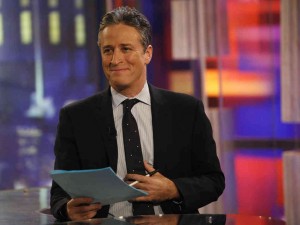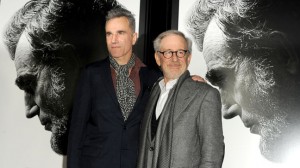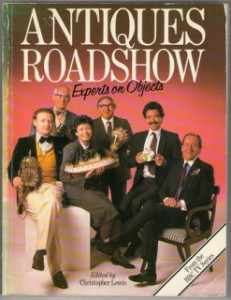Jon Stewart, public historian?
16 January 2013 – Mary Rizzo
 The New York Times blog recently posted a piece about the recent AHA conference in New Orleans. Touching briefly on panels about horses and trash in history, the author pauses momentarily to describe a discussion about “The Public Practice of History in a Digital Age.” While debate ensued over the status of narrative in the discipline, the academic monograph as “fetish object” in Claire Potter’s words, and how what counts for tenure may be hamstringing the profession, the panelists came to agree on one thing: Jon Stewart is a public historian.
The New York Times blog recently posted a piece about the recent AHA conference in New Orleans. Touching briefly on panels about horses and trash in history, the author pauses momentarily to describe a discussion about “The Public Practice of History in a Digital Age.” While debate ensued over the status of narrative in the discipline, the academic monograph as “fetish object” in Claire Potter’s words, and how what counts for tenure may be hamstringing the profession, the panelists came to agree on one thing: Jon Stewart is a public historian.
Why? Because he is good at “confronting politicians with inconvenient truths about the past.”
So, is Jon Stewart a public historian?
What about these folks?
Respond in the comments!
~ Mary Rizzo is Associate Director of the New Jersey Council for the Humanities, where she combines public history and the public humanities in an unholy stew.
Image sources: Jon Stewart, Daniel Day-Lewis and Stephen Spielberg, Antiques Roadshow crew, Hilary Mantel







No, he is not. He might be described more accurately as a public intellectual (although intellectuals are, or should be, by definition publicly minded so the term is redundant). But a public historian should be someone grounded in the arguments, practices, and habits of mind of an academically trained historian. So if Stewart, or Spielberg, etc. have studied history carefully, understood the intellectual and evidentiary rigor demanded of an historian, and then continue with their work as filmmakers, pundits, etc., THEN they are public historians.
Frankly the AHA’s agreement that Stewart is a public historian demonstrates what little regard they have for the field.
It’s an interesting question, one that I think is grounded in how we define public history. I agree with Erik Greenberg that by including Stewart and the other folks you mention in the category, in one sense, we are diluting the integrity of the field. Perhaps it would be more accurate to say that the public historians here are those who are evaluating Stewart and the like, thinking about how they are using historical narratives in their critique and commentary – the ones who, as Greenberg says, are grounded in the arguments/habits/etc… and are using those argument to assess the way public intellectuals/cultural critics are deploying the past?
Of course, as someone relatively new to the “field,” I’m still trying to define these questions for myself.
“Frankly the AHA’s agreement that Stewart is a public historian demonstrates what little regard they have for the field.”
I didn’t get from this story that “the AHA” agreed on this at all. Rather, the AHA’s annual conference had one session, out of hundreds, where this unexpectedly came up. A few of the people who happened to be at that session mulled it over during one part of a broader discussion; and a few of those agreed that, in a way, there might be something to it. It’s a huge leap to go from that ephemeral moment to “they” (who, exactly?) having “little regard” for the field. In fact, it seems improbable that a conference comprised of people who have devoted their lives to the study of history would have “little regard” for it.
Let’s think about a “big tent” definition of public historian. Limiting it to “someone grounded in the arguments, practices, and habits of mind of an academically trained historian” leaves out some of the best and most interesting work – and makes for a pretty boring field. It says, do history our way, the academic way, and then we’ll keep you in our club. What if we defined it to include community historians, enthusiastic amateurs, popular writers, genealogists? We academically trained historians might learn a lot – as well as reach a larger audience. If our goal is to encourage the public to use the past to think about the present and future – I think that’s a fair definition of the purpose of public history – then we want to include all (or at least most) of those folks that Mary RIzzo illustrates above. It’s about ends, not means, and certainly not about technique, practice, or (above all!) being able to write in a really boring way.
–Steve Lubar
For more on this, see Heidi Campbell-Shoaf’s “Who says you are a historian?” – http://march.rutgers.edu/2012/09/12/who-says-you-are-a-historian/
Yes – and also Benjamin Filene’s article in The Public Historian on “passionate histories” and “outsider history-makers” (Winter 2012). The big question for me is “outside of what”? If we see history-making as an activity that is practiced with the highest level of expertise within the (comparatively young) academic profession, then these various “passionate historians” and pop culture figures like Jon Stewart are of course “outsiders.” But if we think of using and exploring the past as a universal and essential part of being in any human culture, then there really isn’t any “outside” – there are just different ways of approaching it, and different kinds of authority-claims (which relate to each other in ways that are endlessly fascinating to think about!).
I agree with Steven. It’s a mistake to persist in defining public history as work done by academically-trained professionals for a public audience. In the digital age, many more people have access to primary sources and are eager to undertake their own interpretations of them using freely-available publishing platforms like blogs and wikis. Some of these interpretations are really interesting and worthy of academics’ and other professional historians’ attention. Other interpretations are worthier of criticism–and that creates new opportunities for the academically-trained public historian to engage with the public.
Isn’t there a difference between the “public practice(s) of history” and “public history/historian”? That Jon Stewart often contextualizes historically his critical comedy, the intent is not to explore the past on its own terms.
As an interdisciplinary scholar trained in material culture and as a former tenured type in a history department and now in a temp job as a museum curator, I’m more concerned about Edward Ayers’ statement in the New York Times: “A historian, Mr. Ayers added, is simply someone who has interesting things to say about the past, and can point to the documentary record to prove them.” If historians cannot get past the idea of the document as paramount, the “big tent” ideal of historical practices won’t ever be realized.
The debate that this has engendered is fantastic! Thank you, Steve Lubar, for making several points that I’ve been honestly hesitant to make myself. The “big tent” idea is part of what draws me to public history and reminds me of the excitement of reading Roy Rosenzweig and David Thelen’s The Presence of the Past, which very humanely acknowledged that history-making goes on in people’s lives in a variety of ways that are amateurish but passionately pursued. In my humble opinion, public history is best when it helps people understand how the world around them got to be the way it is, and that can happen through many formats. In my mind, no historian has written a better explication of contemporary American urban politics than David Simon in The Wire or a more insightful look into the changes in radical politics between the Old and New Left than E.L. Doctorow in The Book of Daniel. Is it possible to see public history, then, as including seriously engaging with such texts as well as the activities of professional historians? I think that doing so would only strengthen the field.